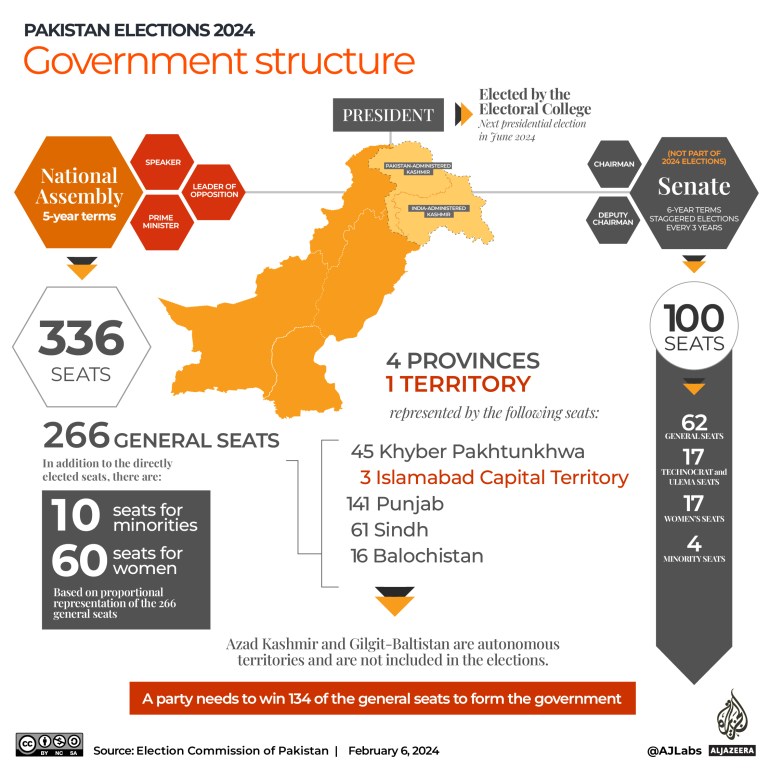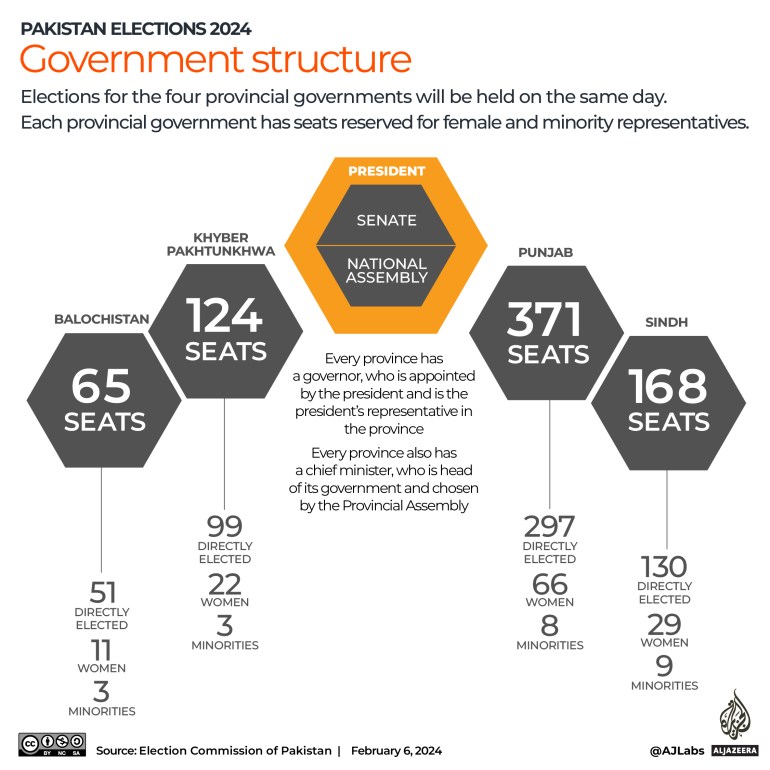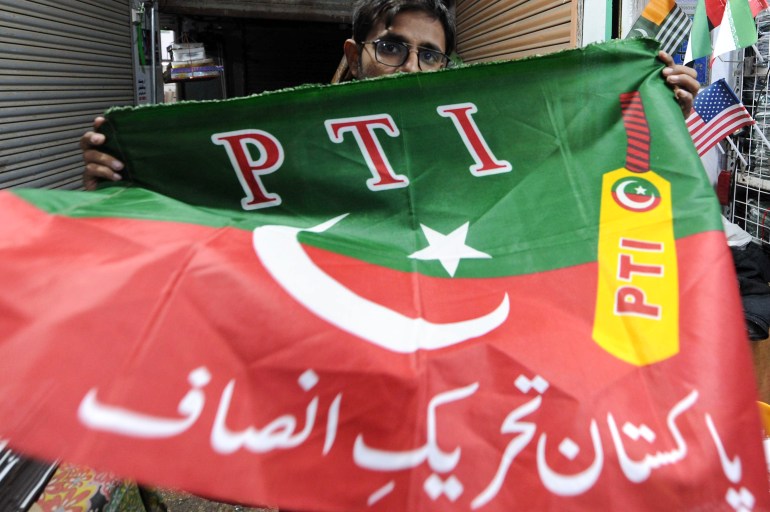Pakistan election: Can Imran Khan’s winning candidates form a government?
Pakistan is in political limbo after a split verdict. But what options does Khan’s PTI have, after candidates won the most seats?

Islamabad, Pakistan — Five days after the elections on February 8, Pakistan is nowhere closer to knowing which parties are going to make its next government and who might be its next prime minister.
The elections delivered a split mandate amid a cloud of questions over the fairness of the climate in which they were held, allegations of serious manipulation, and challenges to the accuracy of the vote counts that dragged on for three days.
Keep reading
list of 4 itemsApril 27, 1994: What has changed in South Africa 30 years after apartheid?
Jobless engineers, MBAs: The hidden army of Indian election ‘consultants’
Focus on southern states as India votes in second phase of mammoth election
Leading with 93 seats are the candidates affiliated with the Pakistan Tehreek-e-Insaf (PTI) of former Prime Minister Imran Khan, who were forced to contest the election as independents, without their electoral symbol, the cricket bat.
They are followed by the Pakistan Muslim League-Nawaz (PMLN) of three-time ex-Prime Minister Nawaz Sharif, which has won 75 seats and in theory, is the single-largest party in the National Assembly, even though the figure amounts to less than a third of the 266 seats that were up for grabs on February 8.
In third place is the Pakistan People’s Party (PPP) led by former Foreign Minister Bilawal Bhutto Zardari, which has secured 54 seats.
But can the PTI-backed independents form or join a government, what are the options for the party, and what comes next for the country?
What’s needed for a government to be formed?

A party or coalition needs a simple majority of 134 seats out of the 266 that were voted on in the National Assembly, to form a government.
A coalition can consist of multiple parties or also include independents who won their seats.
Those independent candidates can either formally join a party that is aiming to form a government or enter an alliance with them while holding their individual identity.
While technically, the PTI-backed independents could form the core of a government in alliance with other parties, whose support they would need to get to the 134-seat mark, such a path presents several challenges.
Firstly, maintaining stability would be difficult. Such a government would depend on the individual whims of independent parliamentarians, making it susceptible to defections and potential collapse.
Secondly, as a collection of independents, the PTI bloc would have to forfeit access to a chunk of the 70 seats reserved for women and minorities, which are shared proportionately among parties represented in the National Assembly.
But if PTI-backed independents were to join another party, they would come under the discipline of that parent party, potentially compromising their ability to act according to the policies and plans of the PTI.
How soon must a government be formed after polls?
Basil Nabi Malik, a Karachi-based lawyer, said that according to the constitution, a new National Assembly session must be summoned within three weeks of the elections.
“The law clearly states that the National Assembly shall meet on the 21st day following the day on which the election to the assembly is held, unless sooner summoned by the president,” he told Al Jazeera.
Unless Arif Alvi, the president, calls the session sooner, 21 days get over on February 29.
On the day of the session, if the parties have finalised their allies and agreed on a coalition, the members of the house will be asked to vote for the prime minister, speaker and deputy speaker.
A leader of the opposition will also be selected from one of the parties which have decided against sitting on the treasury benches.
Which parties have made a move?
PMLN supremo Nawaz Sharif said in a speech on Friday from the party headquarters in Lahore that he had instructed his brother Shehbaz Sharif, also a former prime minister, to reach out to other political parties which have won several seats in the election, to build a governing alliance.
The PMLN leadership has already met with counterparts from the PPP, as well as representatives of the Muttahida Qaumi Movement (MQM), which won 17 seats in Sindh province.
Still, the parties have not declared whether they plan to go ahead with an alliance — and what the contours of any coalition might look like.

What about the PTI? Will its independents join another party?
The PTI, meanwhile, has focused on protesting alleged manipulations in the election results.
The party leadership insists that the actual results of a large number of their seats were overturned, depriving their candidates of victory, and thus ensuring their seats remain under the magical figure of 134 seats.
Sayed Zulfikar Bukhari, a senior PTI member, has categorically said that they will not join hands with any of the major political parties.
“Our internal party discussions and consultations are ongoing, and we have many options on the table,” he told Al Jazeera. “A decision to join a party will be made very soon, but it will not be one of the three or four major parties.”
A total of 13 parties have won at least one seat in the National Assembly elections, of which six have secured a single seat.
If PTI-backed candidates do decide to join any other party, they must announce their decision within three days of the official result notification by the Election Commission of Pakistan (ECP). The ECP has yet to announce the official result.
Is making another party an option for PTI-backed independents?
Kanwar M Dilshad, a former secretary of the ECP and an analyst, said that in theory, the PTI-backed independents could form a new party — though the process of registration could take a few days.
But that won’t help the PTI in government formation right now, since any new party would not have been part of the current election process.
Malik, who is also an advocate at the Supreme Court, agreed with Dilshad’s assessment: PTI-supported independent candidates can form a new political party, but that won’t affect the formation of the incoming government.
“It is [also] questionable as to whether such a political party, established after the elections, shall enjoy the constitutional protections enjoyed by other political parties that had been enlisted and registered with the ECP prior to the elections in question,” he added.
Abid Zuberi, another senior lawyer, said that the independents could alternatively declare themselves a group of “like-minded” members. But that too would not be considered a party.
“They can decide on parliamentary matters en masse, but they will be treated as a group of independents, instead of a party, and thus cannot receive the quota of reserved seats,” Zuberi told Al Jazeera.

Can the PTI get its symbol and party status restored?
While the party’s leader Imran Khan has been in jail since August 2023 and they have been facing a massive, state-led crackdown since at least May last year, the biggest setback they faced was the loss of their election symbol.
They were accused by the ECP of violating laws about holding internal party elections. The party has alleged that this was a decision aimed at reducing the party’s popularity and influence.
The party could seek relief from the Supreme Court of the country, for the reversal of the ECP decision. But it is unclear if even a verdict in the party’s favour would allow the independents it backed to represent the PTI formally in the new National Assembly.
“Now PTI has to hold an election, according to the letter and spirit. But I don’t think it will allow the party to be part of the current parliament since according to ECP, it does not exist as far as the results of these elections are concerned,” said Zuberi, the senior lawyer who was also a former president of the Supreme Court Bar Association.
Senator Ali Zafar, a senior PTI leader as well as part of their legal team, indicated that the party was not confident it would get relief from the top court over the symbol.
“I feel that perhaps, the symbol issue is now over because it was for the purpose of contesting the election. I don’t think it will have any effect post-election scenario. Instead, now it is a question of which party do the PTI-backed candidates join,” he told Al Jazeera.
Malik also criticised the ECP’s original decision to remove the symbol and said that right now there’s little evidence that the move might be reversed anytime soon.
“We also see a lack of urgency in the Supreme Court in fixing this matter for hearing, and it may not be possible to complete this entire exercise before the first session,” he said.